Photo

New month check in! How are y’all doing? 💜While a new month or cycle or season doesn’t necessarily mean everything will change, it does mean we can take inventory of what’s serving us and what we may need to let go. 💜Celebrating our wins is just as important as focusing on what we want to work on. We need balance. Don’t forget how far you’ve come on the way to where you want to be! 💜Take notice of any shifts already occurring...maybe in your sense of awareness, sense of self, mindset shifts, etc. All of that is progress! Awareness is key🙌🏽 💜What are you looking forward to this month? Have you scheduled time to rest and honor yourself? Sending love! 💜💜💜 Marisa (at San Francisco Bay Area) https://www.instagram.com/p/COY5e8KjoaE/?igshid=k7jx9h6f8sq6
0 notes
Text
This advice was unhelpful at the beginning of my healing journey because I LOVED other people to the same degree I HATED myself. I literally couldn’t talk to myself in the loving way I did to other people because I carried a deeply rooted belief that I was unworthy of that same love and compassion—that it was a waste of time, a waste of energy to even try.
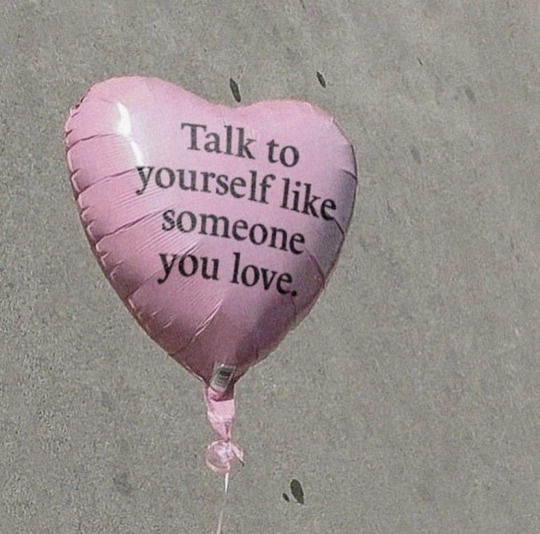
(source: @4amwhistle)
the love you give to others exists within you, too
669 notes
·
View notes
Photo
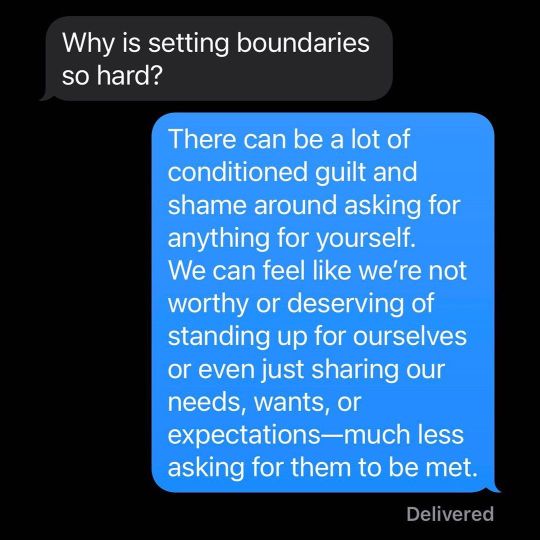
Easier said than done, I know. Letting go of that conditioned self doubt, guilt, and shame isn’t always as easy as saying “I deserve more.” Especially when it’s hard to believe, to integrate, to embody. Especially when time and time again external sources (people, events) “prove” that liming belief of “I’m not deserving, I’m not worthy.” I understand how deeply that feeling cuts. How deeply rooted that belief runs. How hard it is to flip that mindset. But I believe you can do hard things. === What do you think you deserve? === 🌻Hi, I'm Marisa! I'm a trauma informed life coach with a mission to empower survivors of emotional and mental abuse reclaim their birthright of self love and compassion. Interested in more info? Check out the link in my bio or “coaching” highlight or shoot me a DM!🌻 (at San Francisco Bay Area) https://www.instagram.com/p/CN8cSg_D607/?igshid=14fd9yh19xgoz
0 notes
Text
stop defining yourself by what you lack. you are not the absence of qualities, you’re the presence of them.
25K notes
·
View notes
Photo
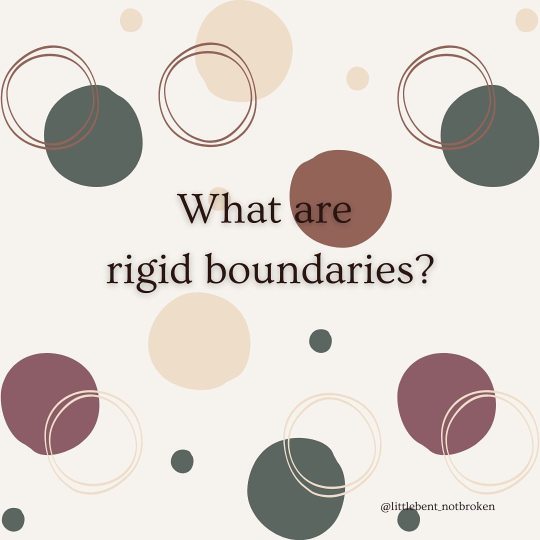
While these examples are primarily focused on boundaries in relationships, I think they can be applied to other things in life. For example, rigid boundaries in workplace could look avoiding a coworker or even a whole department/area of the office (may or may not be from personal experience lollll). It can look like denying yourself help from others, or even being unwilling to help others. With rigid boundaries, there is no contact, limiting all possibility of intimacy or emotional connection or impact. Denying any flow of emotion from other people to you, and also from you to other people. Rigid boundaries can become unhealthy when the lack of emotional connection leads to hyper independence. Hyper independence is the "I have to do everything myself and I don't need anybody else to help me" attitude, which can be unsustainable and lead to resentment, exhaustion, and burnout. *Having rigid boundaries doesn't mean you're "bad" or broken. We may adopt rigid boundaries to avoid people and the way they make us feel, to not allow ourselves to be vulnerable. But we can also adopt them to prevent further harm from an abuser (I.e. going no contact). So if we think of rigid boundaries as unscalable walls and collapsed boundaries the floodgates always being open (nothing to stop the flow of energy coming in or out)…we can think of healthy boundaries as a drawbridge that can be lowered and raised, where the flow of energy is monitored and controlled. Can you identify where you have rigid boundaries in your life? And where healthy boundaries need to be placed instead? === Seeking support in setting healthier boundaries? 🦋Hi, I'm Marisa! I'm a trauma informed life coach with a mission to empower survivors of emotional and mental abuse reclaim their birthright of self love and compassion. Interested in more info? Check out the link in my bio or “coaching” highlight or shoot me a DM!🦋 #rigidboundaries #emotionallydetached #hyperindependence #selfsufficient #ultraindependence #nocontact #avoidantattachment #avoidance #emotionallyunavailable #burnoutprevention #resentment (at San Francisco Bay Area) https://www.instagram.com/p/CNxwMhIDDIa/?igshid=12d0fc0rttrg2
#rigidboundaries#emotionallydetached#hyperindependence#selfsufficient#ultraindependence#nocontact#avoidantattachment#avoidance#emotionallyunavailable#burnoutprevention#resentment
0 notes
Photo
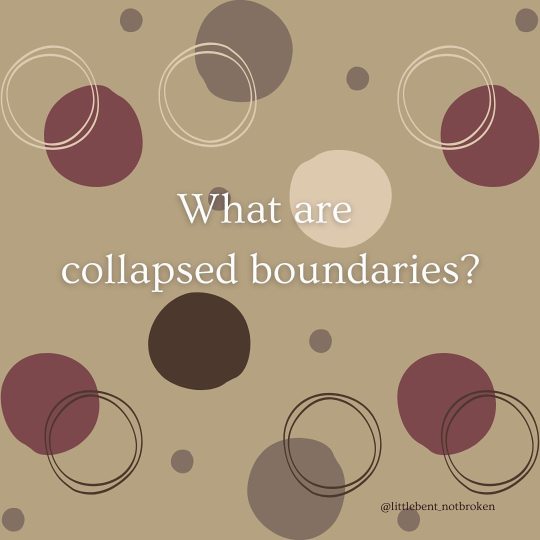
While these examples are primarily focused on boundaries in relationships, I think they can be applied to other things in life. For example, collapsed boundaries in workplace could look living at work (think Apple campus or something) or, as many of us are experiencing, working from home. Collapsed boundaries could also look like your job, university, favorite sport team being an integral part of your identity (employer/school/team is my identity, who I am, my life revolves around them). Of course, there's a difference between being empathetic or compassionate, and being codependent. There's a difference between asking for advice because you value their opinion, and asking for permission because of codependency. Sometimes what's thought of as healthy closeness in a family or friendship is actually unhealthy enmeshment. In collapsed boundaries, it is difficult to identify one person from the other. This can look like enmeshment, loss of identity, needing permission from the other person to move forward with life, changing likes and interests to mirror that of the other person, or even being overly empathic. *Having collapsed boundaries doesn't mean you're "bad" or broken. There are some instances were collapsed boundaries serve a purpose in keeping someone safe or developing a sense of community or acceptance, even if it's not necessarily healthy. Can you identify where you have collapsed boundaries in your life? And where healthy boundaries need to be placed instead? === Seeking support in changing collapsed boundaries to healthy ones? 🦋Hi, I'm Marisa! I'm a trauma informed life coach with a mission to empower survivors of emotional and mental abuse reclaim their birthright of self love and compassion. Interested in more info? Check out the link in my bio or “coaching” highlight or shoot me a DM!🦋 === #codependency #codependentnomore #codependencyrecovery #enmeshment #enmeshedfamily #codependence #enmeshedboundaries #collapsedboundaries #cptsdrecovery #identitycrisis #healingcodependency #regainingindependence #senseofself (at San Francisco Bay Area) https://www.instagram.com/p/CNxsO4gjIeY/?igshid=1846xqp91vpoj
#codependency#codependentnomore#codependencyrecovery#enmeshment#enmeshedfamily#codependence#enmeshedboundaries#collapsedboundaries#cptsdrecovery#identitycrisis#healingcodependency#regainingindependence#senseofself
0 notes
Photo
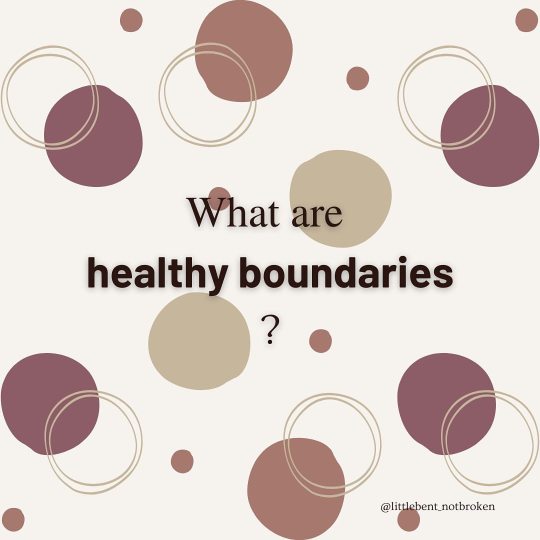
Note: This is not the be all, end all on healthy boundaries. Boundaries are unique to each individual and their relationships. Yesterday we talked about boundaries in general, let’s break it down. While these examples are primarily focused on boundaries in relationships, I think they can be applied to other things in life. For example, healthy boundaries in workplace could look like the company upholds their mission; they stay true to their word and their expectations of each roles' duties. How are your boundaries with yourself? Social media? Money? Time? Etc. Can you identify where you have healthy boundaries in your life and where healthy boundaries need to be placed? If we imagine boundaries as circles, in healthy boundaries, the edges of the circles may touch or slightly overlap. The line or space between them is clear and distinguishable. The boundaries are just close enough for these people to have an impact on each other, but not so overlapping they become lost in each other. Healthy boundaries are flexible and can be lowered to allow emotional connection and extended to ensure safety. With healthy boundaries comes emotional intelligence. These boundaries regulate the flow of emotions, of letting other people in and out as YOU see fit. In relationships, you can have, experience, and manage your own emotions all at the same time. *if you find that you don't have healthy boundaries in some aspect of your life, that doesn't mean you're "bad" or broken. In my experience, I didn't know about boundaries or how to set them until my 20s because boundaries were not something modeled or explained to me as a kid. === Interested in learning how to set boundaries? 🦋Hi, I'm Marisa! I'm a trauma informed life coach with a mission to empower survivors of emotional and mental abuse reclaim their birthright of self love and compassion. Check out the link in my bio or “coaching” highlight or shoot me a DM!🦋 #healthyboundaries #healthycommunication #boundariesarebeautiful #boundarysetting #healthyinterdependence #interdependence #independence #autonomy #independency #emotionalintelligence #emotionalwellness (at San Francisco Bay Area) https://www.instagram.com/p/CNvkU0YDTxe/?igshid=14p8aw3cukiz
#healthyboundaries#healthycommunication#boundariesarebeautiful#boundarysetting#healthyinterdependence#interdependence#independence#autonomy#independency#emotionalintelligence#emotionalwellness
0 notes
Text
Once my boyfriend told me: "You're not a burden. A burden is something you're forced to carry against your will. I freely choose to be a part of your life and that means you aren't a burden to me." I'm passing it on in case some of you need to be reminded of that.
100K notes
·
View notes
Photo
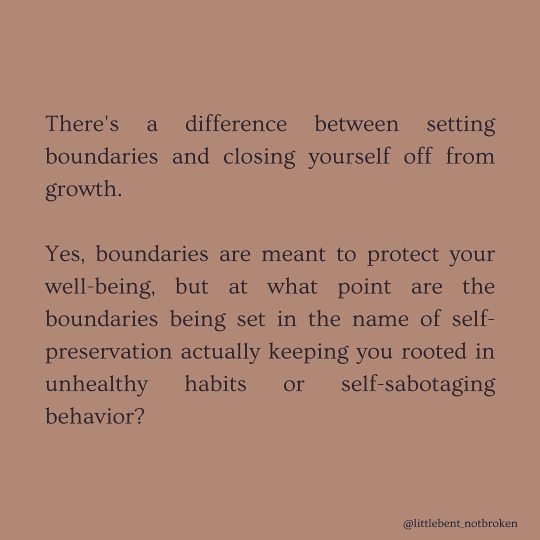
Just some thoughts I had about setting boundaries after my most recent posts and having really great conversations with some of you! & especially my friend @soul_vitamins_ 💛 What are your thoughts? Open to having a (safe & friendly) conversation about this 🤔 (at San Francisco Bay Area) https://www.instagram.com/p/CN0wLILD4_M/?igshid=1mbc0zvl6dokw
0 notes
Photo

From @pisco_cat: “Pisco is giving out free hugs today! Whoever wants one, raise your hand!🙋♂️ ❤️” #cutepetclub [source: https://instagr.am/p/CNdQGj2n6cv/ ]
866 notes
·
View notes
Photo


Autumn Boardwalk (by Andrew Wagner)
Photographer’s Website | Facebook | Twitter | Instagram | 500px
4K notes
·
View notes
Photo



Texturas de agua en Barinatxe, Playing with puddles & Atardecer en Sopelana by Mikel Martinez de Osaba
4K notes
·
View notes
Photo
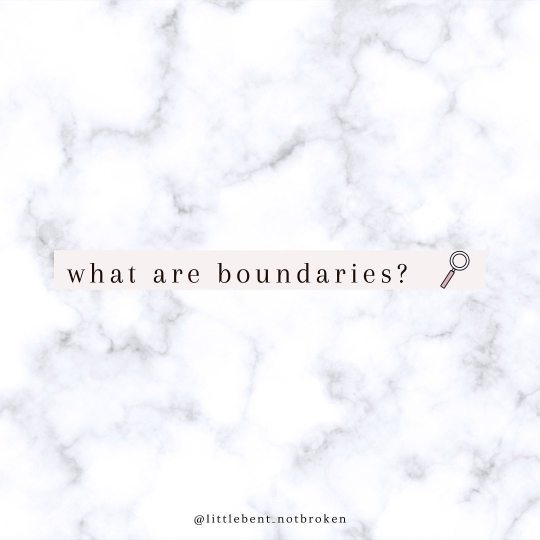
Let's talk about ~boundaries~. Buckle up for a crash course in 3...2...1...🟢 💎Who? *We* set our boundaries and we respect other people's boundaries. No, we don't have control over how they'll respond when we set ours, but we do have control over 1) setting them and 2) enforcing them. 💎What? Boundaries are the limits, rules, or guidelines we set to enforce healthy relationships and ensure emotional well being. 💎When? We can set them at any time, anywhere, with anyone or anything. Yes, our boundaries can change over time. 💎Where? We can set boundaries in person, on the phone, or email. We can set them with friends, family, coworkers, neighbors about various things such as topics, engagement, treatment, etc. 💎Why? We can set boundaries to protect our emotional, mental, or sometimes physical well being. Setting boundaries can help us feel less drained, resentful, and in control of our energy. === While one of these kinds of boundaries is called "healthy," that doesn't necessarily mean the other two are always "unhealthy." We'll get into this more, but essentially: Collapsed boundaries can become unhealthy when the lack of boundaries leads to codependency. Rigid boundaries can become unhealthy when the lack of emotional connection leads to hyper independence. === Was this helpful? Stay tuned for the “how” 🥴 #settingboundaries #boundaries101 #boundariesarehealthy #kindsofboundaries (at San Francisco Bay Area) https://www.instagram.com/p/CNs0GQAD2BJ/?igshid=11wdlr1cxdwf0
0 notes
Photo
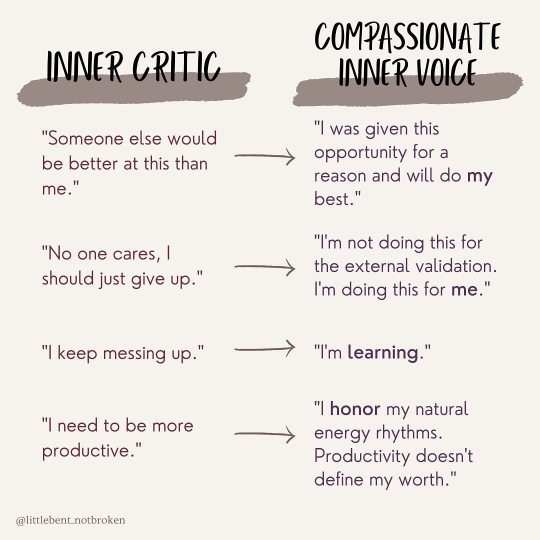
I've used the visualization before of asking yourself what you would tell a friend in the same situation (usually words full of compassion and love) and telling yourself the same thing. Today I want to offer another perspective: What do you WANT to hear instead of the inner critic? Maybe it's something you needed to hear when you were younger. ("I'm proud of you.") Maybe it's something you want someone to say to you right now. ("It's going to be okay.") Maybe it's something already stirring inside that's trying to get your attention. If we imagine the voices in our head as being different radio stations, which station would you rather stop on and listen to? And I know it's not always that easy--if it were as easy as changing a channel, the inner critic would never be heard. But for the purposes of the analogy, let's give ourselves the power and permission to change the channel. To say, "Hey, I hear this song [inner critic] and I don't like it, let's see what else is on." What else might you hear? What would you rather listen to? My mission is built upon the belief that everyone carries a wise, compassionate inner voice. This voice might already be loud enough to be heard, to cut through and talk back to the inner critic. Or maybe it's a faint blip on the radio and if we turn the dial just right or move to a different place in the house, it comes through more clearly. Perhaps you yourself need to take back control of the radio instead of letting other people change the channels (offering their thoughts/opinions that may or may not be helpful in that moment). (Am I super dating myself talking about radios and dials?) #innervoice #selflove #innercritic #emotionalawareness #empoweringthoughts #cognitivedistortions #innerdialoguecoach #youareworthy #emotionalabuse #mentalabuse #productivityhabits (at San Francisco Bay Area) https://www.instagram.com/p/CMfqdLFD9_u/?igshid=1l84eckuujbk2
#innervoice#selflove#innercritic#emotionalawareness#empoweringthoughts#cognitivedistortions#innerdialoguecoach#youareworthy#emotionalabuse#mentalabuse#productivityhabits
1 note
·
View note
Photo
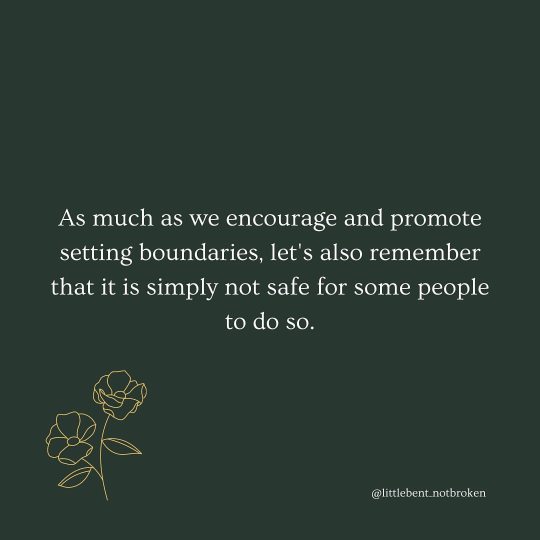
"Why didn't you just leave?" "Why didn't you just say no?" "Just set some boundaries with them." As well-intentioned as these phrases may be, it is not always safe for boundaries to be set. And I don't just mean that it doesn't FEEL safe--that the shame and guilt is so debilitating we can't set boundaries (as valid of a feeling that is). Today I'm talking about those toxic, abusive, harmful relationships in which boundaries, assertiveness, or any sniff of "rebellion" could be physically dangerous. This relationship could be with a parent, friend, or partner. Or even as a woman telling a stranger "no." Yes, boundaries are important; we're constantly told how important they are. Yes, boundaries are meant to ensure the safety of your well-being; healthy boundaries can be lowered to promote intimacy and extended to promote safety. And yes, not everyone is in a safe place to set them. That doesn't mean they're not trying, that they don't want the abuse to stop, that they just need to suck it up and do it. It just means boundaries are not the key to their safety and their energy to ensure peace must go to what serves them better. When I was a kid, after so many times of trying to say "no" and not being heard/respected and met instead with violence, I learned that 'no' = 'unsafe.' That talking back, speaking up, and standing up for myself = putting myself in danger. I know now that I do have control and power over how I respond when my boundaries are crossed, usually because I sense there's an equal playing field. But as a kid, when parents are simultaneously caregiver and authority, the power balance seems askew. So here's a friendly reminder that even though you know boundaries need to be set AND you know it is not safe to do so: you are not failing, you are not allowing or co-creating the abuse; you are surviving. And that's all that can be asked of you. Stay strong, loves💜 #traumarecovery #traumahealing #traumainformed #traumasurvivor #cptsdawareness #cptsdsurvivor #emotionalwellbeing #physicalwellbeing #emotionalabuserecovery #mentalabuserecovery #abuserecovery #recoverywarriors #friendlyreminder #narcissisticabusesurvivor #toxicrelationships (at San Francisco Bay Area) https://www.instagram.com/p/CMapwc0jlYg/?igshid=1xmq9d7homd4
#traumarecovery#traumahealing#traumainformed#traumasurvivor#cptsdawareness#cptsdsurvivor#emotionalwellbeing#physicalwellbeing#emotionalabuserecovery#mentalabuserecovery#abuserecovery#recoverywarriors#friendlyreminder#narcissisticabusesurvivor#toxicrelationships
0 notes
Photo
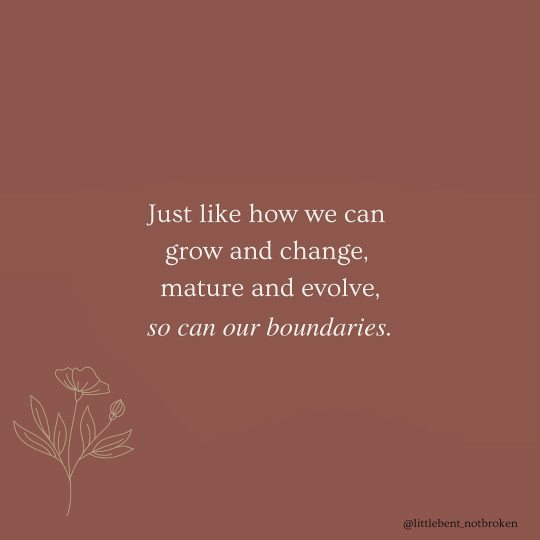
Here's your reminder that boundaries can be adjusted as you adapt, evolve, and bloom. You might be thinking, “well duh.” But this is something I didn’t realize—that my relationships could change, that I wasn’t stuck or fixed in a dynamic I felt like I had no control over. Boundaries, in the sense of relationships (friends, family, romantic partners, coworkers, etc), can be lowered to allow intimacy as connection, or they can be extended to ensure safety. We may find that a boundary needs to be set where there was none before (moving from enmeshed or collapsed boundaries to healthy boundaries). We may find that a previously set boundary can be relaxed (moving from rigid boundaries to healthy boundaries). I'll talk more about this later, but a brief breakdown of healthy, collapsed, and rigid relational boundaries: 🪴Healthy boundaries are easily identifiable between one person and the other person, but they are close enough to have an impact on each other. 🪴Collapsed boundaries looks like enmeshment or codependence. These people are lost in each other. One person's thoughts/feelings/opinions become the other's and vice versa. No one can move forward without the other's permission. 🪴Rigid boundaries look like tall, thick walls that prevent any kind of emotional connection or intimacy. These various kinds of boundaries may have served us at certain times in our lives. Collapsed boundaries, while not "healthy," did protect me in childhood by keeping the peace. Rigid boundaries, while not "healthy," did keep protect my emotional wellbeing after a breakup. All of this to say: You are in control over setting and enforcing boundaries. You are in control of lowering and extending boundaries. And you are in control of how to respond to boundaries being crossed, minimized, or disrespected. ✨I have three spots open for 1:1 coaching starting April 1! Check out the “coaching” highlight on my page or click the link in bio!!✨ #boundaries #boundariesarehealthy #healthyboundaries #setboundaries #settingboundaries #boundariesarebeautiful #collapsedboundaries #rigidboundaries #codependencyrecovery #emotionallyunavailable (at San Francisco Bay Area) https://www.instagram.com/p/CMOI-QnDVNe/?igshid=5otyrvbh1787
#boundaries#boundariesarehealthy#healthyboundaries#setboundaries#settingboundaries#boundariesarebeautiful#collapsedboundaries#rigidboundaries#codependencyrecovery#emotionallyunavailable
0 notes
Photo
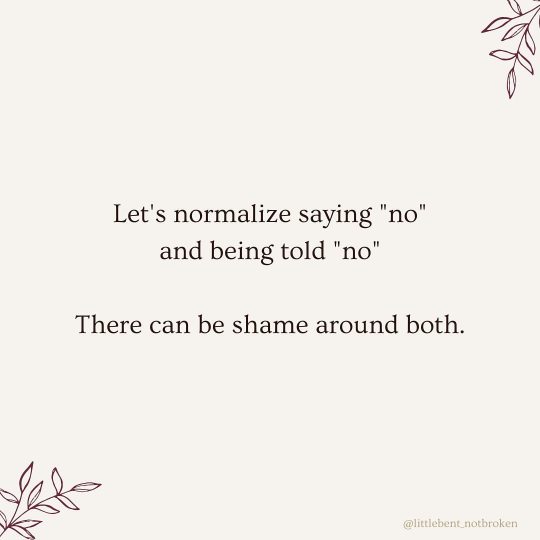
Setting a boundary and saying "no" doesn't make you a selfish, mean, or bad person. Being told "no" doesn't mean you are a burden, annoying, or unworthy of support. I often wonder when we began to believe that "no = bad" and "yes = good". My mind goes to 1st grade, when I was told by my teacher, "no, you're wrong" in front of the class and I remember the deep shame that can creep in. "I'm wrong, I'm not smart, everyone knows it now." (Yes, that thought has been following me around since 1st grade.) After being told "no" so many times in childhood and my questions setting my mom off into a violent tirade, I eventually just stopped asking anything. After being told "no" so many times, I was conditioned to believe that 1) the answer would always be no and 2) asking questions wasn't safe, questions were annoying, questions were a burden. I was a burden. So I stopped asking to stop feeling guilt and shame. I didn’t ask for help, I didn't answer questions in class (what if I got it wrong again and everyone thought I was stupid?), I pretended like I knew everything so I didn't have to ask questions. And then--if you also grew up in a religious community like I did--there's the guilt that comes with saying "no," because being unwilling to self-sacrifice means you're not being a "good enough" Christian (or whatever religious institution you subscribe to). The woman must be submissive to her husband. What would Jesus do? (and I'm not knocking religion, but there was shame for me in this area). How can we practice saying no? even if our voice or hands shake? Even if our stomach feels queasy? How do we let go of the shame? Maybe by starting to realize there’s nothing to be shameful of. Saying or being told “no” isn’t a poor reflection of us. In fact, maybe it’s the opposite. Being able to say and hear “no” without shame or guilt is one of the strongest things we can do on our healing journey. #sayingno #justsayno #perfectionism #progressnotperfection #motherwound #wholeheartedliving #childhoodabuse #gaslightinghealing #selfcompassion #anxietyrelief #selfawakening #codependency #youmatter #lovelanguage #peoplepleasing #recoveringpeoplepleaser (at San Francisco Bay Area) https://www.instagram.com/p/CMK4iClDlYA/?igshid=t7v303ofktlg
#sayingno#justsayno#perfectionism#progressnotperfection#motherwound#wholeheartedliving#childhoodabuse#gaslightinghealing#selfcompassion#anxietyrelief#selfawakening#codependency#youmatter#lovelanguage#peoplepleasing#recoveringpeoplepleaser
0 notes